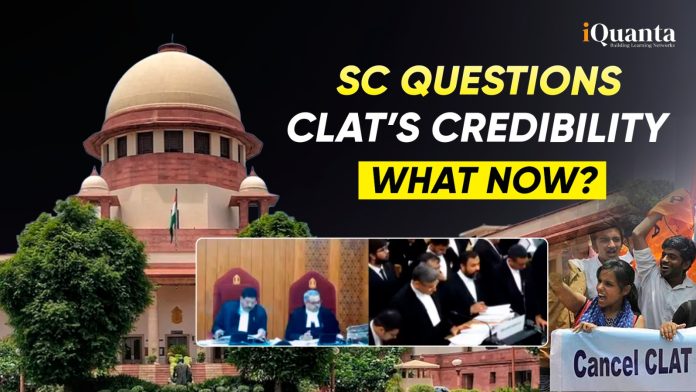On May 7, 2025, a Bench headed by Justice B.R. Gavai and Justice A.G. Masih expressed disapproval towards the Consortium of NLUs for framing questions in CLAT-UG 2025 in a “casual manner,” thereby raising questions on the reputations of countless aspirants. The Court took action on six questions—modifying answers, eliminating erroneous ones, and instructing the creation of a new merit list. Additionally, it demanded a 2015 petition advocating for the establishment of a permanent examination authority similar to examinations such as NEET and JEE.

Timeline of What Happened
Before diving into the issue raised by the Supreme Court, you should know about the events that led to the questions being raised about the credibility of the CLAT Examination. Check out below to know more about the same:
| Date of Event | Event |
| Dec 1, 2024 | The Common Law Admission Test was conducted by the Consortium of National Law Universities. |
| Dec 7, 2024 | The results were declared, and the initial protests over the errors in the examination began. |
| April 23, 2025 | Delhi High Court reviews the 17 questions and also orders a partial amendment in the questions. |
| May 7, 2025 | Supreme Court slams on the Consortium of National Law Universities and orders a revised answer key and merit list |
Supreme Court’s Criticism towards the Common Law Admission Test
Certain key points became the centre of criticism by the Supreme Court and led to the remarks of casual framing of questions by the Consortium of National Law Universities. They have been listed below:
- Inconsistent legal reasoning on questions not included in the stated syllabus.
- Certain questions required extensive calculations—improper for a reasoning-focused law aptitude examination.
- Recurrence of previous mistakes: The Supreme Court had identified similar issues in 2013 and 2018—yet no corrective measures have been taken until now.
Additionally, the Court observed that its previous order from 2018 to establish a permanent agency for conducting CLAT had not been implemented. It addressed the earlier petition on its initiative, issuing notices to the Centre and the Bar Council of India for enforcement.
Supreme Court’s Action Towards Six Questions
The Supreme Court addressed six significant inquiries (No. 56, 77, 78, 85, 88, 115/116), and issued the following directives:
- For Question 56: Award positive marks to both (C) and (D); assign negative marks to (A)/(B) due to inadequate framing regarding the environmental duty question.
- For Question 77: Confirmed that the correct answer is (B); clarified the ambiguity surrounding the definition of a void contract.
- For Question 78: Concurred with the High Court that (C) is the correct answer; upheld the removal of the other options.
- For Questions 85 and 88: Both were deleted; these questions were found to overlap and misalign with established testing standards.
- For Questions 115 and 116: Completely removed; deemed calculation-intensive and inappropriate for objective assessment.
The following changes were observed after the questions raised by the Supreme Court:
- The merit list will be updated.
- Questions that were deleted or modified will no longer be considered.
- Ensured alignment with the previous ruling of the Delhi High Court—some directives were upheld while others were altered.
Voices From Student Council
After the issue was addressed by the Supreme Court, there was multiple feedback from students, coaching centres, the government and the Consortium. The feedback has been addressed below:
Student & Coaching Institute Feedback
- Total dissatisfaction with logic questions with missing correct options or unclear wording
- Multiple sets (A‑D) were of unequal difficulty, even though uniformity in the questions was declared.
Legal Community Response
- Attorneys KK Venugopal and Gopal Sankaranarayanan pointed to recurring errors in CLAT dates and question design (2013, 2018, 2025).
- They called for the creation of a permanent exam authority, as proposed previously in Basheer’s petition.
Government & Consortium
- Repeatedly asked to reply to why CLAT isn’t being conducted like NEET. Centre & BCI issued notices to delineate reform plans.
Join CLAT Course

FAQ’s
Supreme decided to do so because of the multiple errors in the design of the questions and answer keys, affecting the students’ careers and the authenticity of the examination.
The Supreme Court says that CLAT has a casual manner of framing questions, which means that they have a careless design of questions with insufficient academic rigour, causing unreliable evaluation.
Yes, indeed, two times. The Supreme Court had raised questions on the quality of the examination previously in the years 2013 and 2018, which remains unresolved till now.
Yes, it has been decided that the CLAT merit list will be revised after the correction of all the answers and deletion of the flawed questions.
The Supreme Court has asked the Centre and BCI to consider a permanent and professional examination conducting body for CLAT, similar to examinations such as JEE and NEET.




